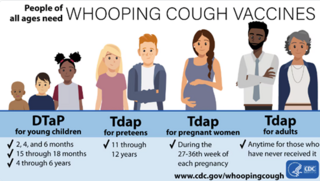Key takeaways:
- COVID, flu and RSV are quiet—for now. Good time to vaccinate!
- Whooping cough
- H5N1 avian influenza
COVID, flu, and RSV
We have finally emerged from our summer COVID wave. COVID emergency department visits, hospitalizations, and wastewater levels are at their lowest point since June. Seasonal flu and RSV activity are both minimal right now too, so this is a good time to get vaccinated before activity picks up again.
- Get your flu and updated COVID vaccines through the Flu and COVID Vaccine Program. You can get both at once. Both are recommended for all individuals aged 6 months and older. Appointments may be self-scheduled here and are available most days, and we are now accepting walk-ins at Yale Health Center for both vaccines.
- The CDC has just approved the recommendation that those 65 and older, or with moderate or severe immune compromise, should get a second dose of the 2024-25 updated COVID vaccine 6 months after their first dose.
- Free COVID tests are again available from the federal government. Order yours at COVIDtests.gov.
Home testing for both flu and COVID
New home tests are now available that test for flu A and B and COVID in one kit. Most of these are rapid antigen tests similar to the COVID tests we have been using. They cost about $30 for a two-pack and are available online and in pharmacies. Here are some useful details:
- As with COVID tests, false negatives may occur, especially early in infection, so repeat testing is needed if an initial test is negative and symptoms persist.
- Once flu season begins, these combination tests will be helpful because symptoms of flu and COVID are indistinguishable but are treated differently. This is especially important if you are at increased risk for complications or live with someone who is vulnerable.
- Outside of flu season, a regular COVID test is the best (and cheapest) bet.
RSV vaccine
Now is also the time to consider getting the RSV vaccine, available through your healthcare provider. This vaccine is important for two groups:
- Adults aged 75 and older, and those 60-74 with certain health conditions. RSV is not an annual vaccine; if you have already received it, then you don’t need another dose.
- Babies are at highest risk from RSV. They are protected by either 3rd-trimester maternal vaccination or by immunization with the antibody nirsevimab between October and March. Eligible infants include those under 8 months old, or those 8-19 months old with increased risk for severe RSV.
Whooping cough
Whooping cough, or pertussis, once a common childhood infection and cause of infant death, gradually declined after the advent of vaccines in the 1940s. However, cases are now on the rise. Nationally, pertussis cases are 5 times higher this year than they were last year at this time and are at a 10-year high. Connecticut has seen an increase too.
What is it?
Pertussis is a bacterial infection that begins like a common cold but can progress to severe coughing fits, often followed by a “whoop” sound as the person gasps while inhaling. Vomiting may occur after coughing.
- Most cases still occur in young children before they are fully vaccinated. However, pertussis can also occur in vaccinated people, including adults.
- Pertussis is highly contagious, affecting 80% of household contacts.
- Infected individuals should receive antibiotic treatment, and others in the household (parents, siblings, roommates) who have been exposed should also receive preventive antibiotics.
- Pertussis is an underrecognized cause of prolonged cough (over 2 weeks) in adults.
What should you do?
- Be aware. If you or your child develops a paroxysmal cough, whooping sounds, breathing difficulties, or vomiting during or after coughing, contact your healthcare provider.
Stay up to date on vaccination. The vaccine reduces pertussis risk and is recommended for both children (DTap) and adults (Tdap). Vaccination is particularly important for pregnant women as it prevents disease in vulnerable infants. Kids should stay on schedule. Adults should check MyChart to make sure you’ve had Tdap vaccination at least once as an adult and schedule an appointment if you need an update.
